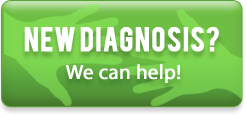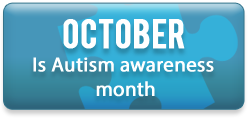Autism varies tremendously in severity:
At its most severe, individuals with autism have symptoms of extremely repetitive and unusual behaviours which may include self-injury and aggression. Without appropriate intensive intervention, these symptoms may be very persistent and difficult to change. Living or working with a person with severe autism can be very challenging, requiring tremendous patience and understanding of the disorder. In its mildest form, however, autism is more like a personality difference due to difficulties in understanding social conventions.
Children with ASDs develop differently and at different rates from other children their age in the areas of motor, language, cognitive and social skills growth. They might be very good at advanced or complex skills such as solving math problems but find the “easy” things, like talking or making friends’ very difficult. Some children with ASDs develop large vocabularies and can read long words but may be unable to vocalize the sound of a single letter. A child may also learn new skills, such as saying a number of words, but lose this ability later on.
A Wide Spectrum of Disabilities and Different Abilities
- Social Interaction:
- Some people with ASDs may prefer to be left alone, showing no interest in people at all. They may not notice when people are talking to them.
- Others may interact strangely with people. They might be very interested, but not know how to talk, play or relate to others. Difficulty “joining in” is common in ASDs because it is hard to “read” or understand other people. For adults, difficulty with verbal and non-verbal communication can make interaction with others very stressful.
- Children with ASDs may not relate to their own age group and prefer the company of adults.
- Some people with ASDs make no eye contact or are less responsive to eye contact. Some use peripheral vision rather than looking directly at others.
- They might not respond to or understand smiles and facial gestures.
- Touch may feel painful or upsetting to persons with ASDs and they might withdraw from family members. Children with ASDs might not like to be held or cuddled, or might cuddle only on their terms.
- People with ASDs often have trouble talking about their own feelings or understanding other people’s feelings.
- Difficulty controlling emotion and excitement can also affect social interaction.
- Verbal and Non-verbal Communication:
- Speech and language skills may begin to develop and then be lost, or they may develop very slowly or they may never develop. Without appropriate intensive early intervention, more than 40% of children with ASDs do not talk at all.
- Some will communicate with gestures like pointing or reaching instead of words. It may be difficult or impossible to imitate sounds and words.
- Others have echolalia, which is repeating something heard. For example, if you ask, “Are you cold?” the response may be, “Are you cold?” instead of answering the question. The repeated words might be said right away or much later and may be repeated over and over. Or, a person might repeat something they heard on TV or in the past.
- Words may also be used without their usual meanings. People with autism may confuse gender, saying “he” when they mean “she” or vice versa, and/or pronouns (I, me, and you).
- They might not respond to or understand smiles and facial gestures.
- Touch may feel painful or upsetting to persons with ASDs and they might withdraw from family members. Children with ASDs might not like to be held or cuddled, or might cuddle only on their terms.
- People with ASDs often have trouble talking about their own feelings or understanding other people’s feelings.
- Difficulty controlling emotion and excitement can also affect social interaction.
- Repeated and Unusual Behaviors, Interests and Routines
- People with autism may have ritualistic actions that they repeat over and over again, such as spinning, rocking, staring, finger flapping, hitting self, etc.
- They may be overactive or very passive and can show intense anxiety or an unusual lack of anxiety. Anxiety, fear and confusion may result from being unable to “make sense” of the world in the usual way.
- They may take unusual risks with no fear of real dangers.
- Unusual postures, walking or movement patterns are common.
- They might fiercely depend on routines and want things always to stay the same so there are no surprises. Small changes in the environment or in daily routines that most people can manage (e.g. dressing in a different order, going to school by a new route or having new people around) might trigger acute distress or fear.
- People with ASDs often have a restricted pattern of interests and may have seemingly odd habits: they may talk about or focus obsessively on only one thing, idea, activity or person. Sometimes these habits or interests are unusual or socially inappropriate.
- Responses to Sensations:
- People with ASDs may have both auditory and visual processing problems, and sensory input may be scrambled and/or overwhelming to them. Sensory sensitivities vary in autism, from mild to severe hyper and hypo-sensitivities.
- Unusual sensitivities to sounds, sights, touch, taste and smells: e.g. high-pitched intermittent sounds, such as fire alarms or school bells, may be painful. Rough or scratchy fabrics may be intolerable. People may have unusual sensitivities to the flickering of fluorescent lights. One or a combination of senses or responses can be affected.
- Some people with ASDs have very high pain thresholds (i.e. insensitive to pain) or very low pain thresholds.
- Co-occurring Conditions: Many individuals with autism have other health problems:
- Neurological disorders including epilepsy
- Gastro-intestinal problems, sometimes severe
- Compromised immune systems
- Fine and gross motor deficits
- Anxiety and depression
- Effects on Learning:
- Many of the characteristics and aspects of ASD listed above can interfere with the ability to learn through typical teaching methods.
- Lack of spontaneous or imaginative play (e.g. may use only parts of toys; line up or stack objects; no imaginative/pretend play).
- An inability to imitate others. (e.g. sounds, gestures, gross or fine motor movements, etc.).
- Inability to focus on the task at hand. Some will have a very short attention span or concentrate only on one thing obsessively.
- Difficulty sharing attention with others.
- Difficulty with abstract ideas (e.g. difficulty using items or toys to represent real objects).
- Difficulty grasping the concept of time and order of events.
- Unique Abilities
- Individuals with ASDs have their own strengths and unique abilities.
- Some people with an ASD have an accurate and detailed memory for information and facts, high visual recall and a superb ability to manipulate data for useful purposes.
- They may be able to concentrate for long periods of time on particular tasks or subjects and be far more attentive to details than most people.
- People with an ASD sometimes have unusually good spatial perception and exceptional long-term memories, allowing them to excel in areas of music, math, physics, mechanics, science and technologies, and architecture.




